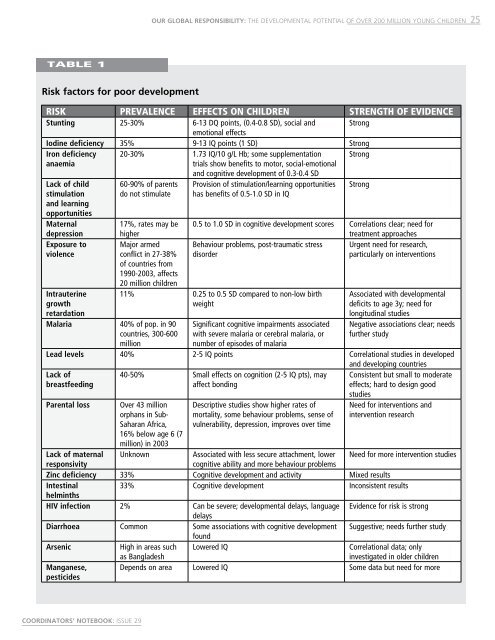A global call to action for early childhood
A global call to action for early childhood
A global call to action for early childhood
Create successful ePaper yourself
Turn your PDF publications into a flip-book with our unique Google optimized e-Paper software.
Our <strong>global</strong> responsibility: The developmental potential of over 200 million young children<br />
25<br />
TABLE 1<br />
Risk fac<strong>to</strong>rs <strong>for</strong> poor development<br />
Risk Prevalence Effects on children Strength of Evidence<br />
Stunting 25-30% 6-13 DQ points, (0.4-0.8 SD), social and Strong<br />
emotional effects<br />
Iodine deficiency 35% 9-13 IQ points (1 SD) Strong<br />
Iron deficiency<br />
anaemia<br />
20-30% 1.73 IQ/10 g/L Hb; some supplementation<br />
trials show benefits <strong>to</strong> mo<strong>to</strong>r, social-emotional<br />
and cognitive development of 0.3-0.4 SD<br />
Strong<br />
Lack of child<br />
stimulation<br />
and learning<br />
opportunities<br />
Maternal<br />
depression<br />
Exposure <strong>to</strong><br />
violence<br />
Intrauterine<br />
growth<br />
retardation<br />
60-90% of parents<br />
do not stimulate<br />
Malaria 40% of pop. in 90<br />
countries, 300-600<br />
million<br />
Provision of stimulation/learning opportunities<br />
has benefits of 0.5-1.0 SD in IQ<br />
17%, rates may be<br />
higher<br />
Major armed<br />
conflict in 27-38%<br />
of countries from<br />
1990-2003, affects<br />
20 million children<br />
11% 0.25 <strong>to</strong> 0.5 SD compared <strong>to</strong> non-low birth<br />
weight<br />
Strong<br />
0.5 <strong>to</strong> 1.0 SD in cognitive development scores Correlations clear; need <strong>for</strong><br />
treatment approaches<br />
Behaviour problems, post-traumatic stress Urgent need <strong>for</strong> research,<br />
disorder<br />
particularly on interventions<br />
Significant cognitive impairments associated<br />
with severe malaria or cerebral malaria, or<br />
number of episodes of malaria<br />
Associated with developmental<br />
deficits <strong>to</strong> age 3y; need <strong>for</strong><br />
longitudinal studies<br />
Negative associations clear; needs<br />
further study<br />
Lead levels 40% 2-5 IQ points Correlational studies in developed<br />
and developing countries<br />
Lack of<br />
breastfeeding<br />
40-50% Small effects on cognition (2-5 IQ pts), may<br />
affect bonding<br />
Consistent but small <strong>to</strong> moderate<br />
effects; hard <strong>to</strong> design good<br />
studies<br />
Parental loss<br />
Over 43 million<br />
orphans in Sub-<br />
Saharan Africa,<br />
16% below age 6 (7<br />
million) in 2003<br />
Unknown<br />
Descriptive studies show higher rates of<br />
mortality, some behaviour problems, sense of<br />
vulnerability, depression, improves over time<br />
Need <strong>for</strong> interventions and<br />
intervention research<br />
Lack of maternal<br />
responsivity<br />
Associated with less secure attachment, lower<br />
cognitive ability and more behaviour problems<br />
Need <strong>for</strong> more intervention studies<br />
Zinc deficiency 33% Cognitive development and activity Mixed results<br />
Intestinal<br />
33% Cognitive development Inconsistent results<br />
helminths<br />
HIV infection 2% Can be severe; developmental delays, language Evidence <strong>for</strong> risk is strong<br />
delays<br />
Diarrhoea Common Some associations with cognitive development Suggestive; needs further study<br />
found<br />
Arsenic<br />
High in areas such Lowered IQ<br />
Correlational data; only<br />
as Bangladesh<br />
investigated in older children<br />
Manganese, Depends on area Lowered IQ Some data but need <strong>for</strong> more<br />
pesticides<br />
COORDINATORS’ NOTEBOOK: ISSUE 29
















